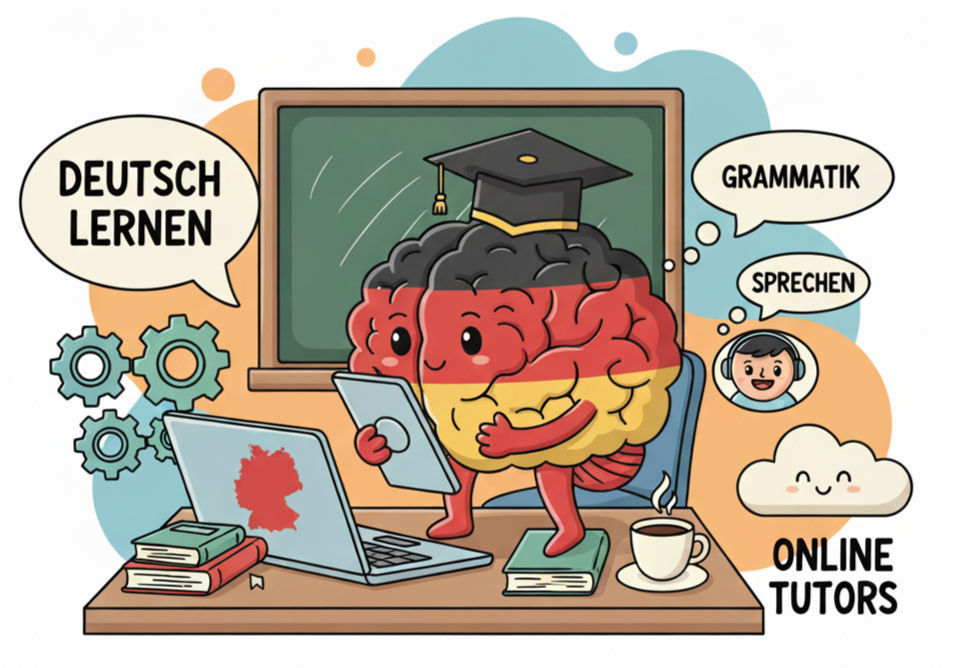Learn German like Natives vs Learn German from a Native
- Surenthar Manoharan
- Jul 27, 2025
- 4 min read
Updated: Oct 16, 2025
This page is titled "Learn German Like a Native," and you might wonder, "If you are not a native, why do you name your page as if you were one?" Well, the title of this blog would be different if I were a native. I would say, "Come and learn German from a native speaker." However, "Learn German Like a Native" emphasizes how natives learn the language. The way you were taught as a child was not a stressful method of rote memorization, was it?
Since your belief system convinces you that learning a language from a native can help you learn much faster, here is the difference when you learn naturally like a native compared to rigid learning in a classroom from a native speaker:

Why "Learning German Like a Native" is Important
Learning a language is a journey. It’s not just about memorizing vocabulary or grammar rules. It’s about understanding culture, context, and communication. This is where the phrase "learning German like a native" comes into play. It emphasizes the importance of immersive, natural learning experiences.
1) More Practice vs. More Memorization
Learning like a native means immersing yourself in real language use. You’re not sitting with flashcards trying to memorize 50 irregular verbs. Instead, you hear them in songs, games, conversations, and stories repeatedly until they become second nature.
On the other hand, learning from a native in a formal classroom often leads to an approach that is primarily based on memorization. You focus on vocabulary lists, conjugation tables, and grammar exercises that are rarely used in actual conversation. You remember the rule but can’t apply it in the moment.
Verdict: Practice fosters fluency. Memorization improves test scores. Choose wisely.
2) Application-Based Learning vs. Book-Based Learning
Native learning is highly situational. You learn "I’m hungry" because you are hungry. You learn "Watch out!" because someone shouts it as a car passes by. You learn with a purpose, directly connected to action.
Learning from a native (especially in structured classes) often relies heavily on textbooks. You might learn vocabulary lists about "the airport" when you are far from it, or formal letter writing in A2 while you just want to ask for a coffee.
Verdict: Books are helpful, but if you don’t use the language for real things in real ways, it won’t stick like learning in a native style.
3) Learning Relating to Yourself vs. Learning Relating to Germans (or Swiss or Austrians 😅)
When learning a foreign language, remember that you are a native speaker of another language. You adopt the mindset and thought process of your mother tongue early in childhood. Once you surpass this phase, learning a new foreign language can be disruptive to your brain’s current system.
The best way to learn a foreign language is not to overwhelm yourself with 100% of that language. Hearing German repeatedly, especially at the beginning, can feel like watching a German movie without the intention to learn and just using subtitles. At the end of the day, how much do you think you learned this way? 🥚🥚
Some German courses taught by native speakers often explain things in a way that makes sense in their own cultural context—holidays you’ve never heard of, jokes you don’t understand, or phrases that leave you puzzled. This creates a sense of alienation from the language.
Verdict: If it doesn’t relate to you, it won’t stick with you. Make the language your style instead of the other way around.
4) 24/7 Optimistic Focus vs. 24/7 Desperate Focus
Learning like a native has a magical ingredient: low-threshold repetition with high optimism. Children are not stressed when they correctly conjugate "to be" at the age of 3. They keep talking, laughing, getting gently corrected, and trying again. Every mistake is part of the progress.
When you start learning the language, remember that you won’t always get everything right. Embrace mistakes and learn from them. Your learning partner or tutor should be humorous and entertaining, not too serious.
Learning from a native in formal settings can, however, lead to perfection anxiety. You may feel the need to speak perfectly to impress your native teacher. The focus shifts to correctness, and every mistake feels like a failure. It’s exhausting.
Verdict: Stay playful. Stay curious. Focus on communication, not perfection.
5) The Importance of a Personalized Approach
Learning German like a native is about immersion, self-reference, natural repetition, and self-confidence. There’s nothing wrong with learning from native speakers; in fact, it can be a great advantage! But the real breakthrough comes when you start learning in a way that feels like you.
So, no, I may not be a native German speaker—but I’m here to help you think, feel, and speak like yourself, in your own native style.
And that makes the difference.
Conclusion
In summary, learning German like a native is more than just vocabulary and grammar. It’s about immersing yourself in the language, understanding its cultural context, and applying it in real situations. By focusing on practice, application, and a personalized approach, you can make your language learning experience enjoyable and effective.
Embrace the process, stay curious, and remember that every mistake is a step toward fluency. Enjoy your learning journey!









Comments